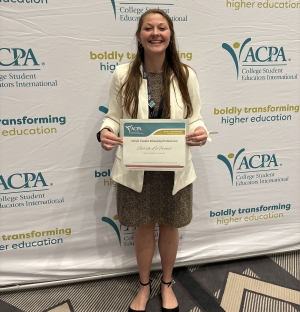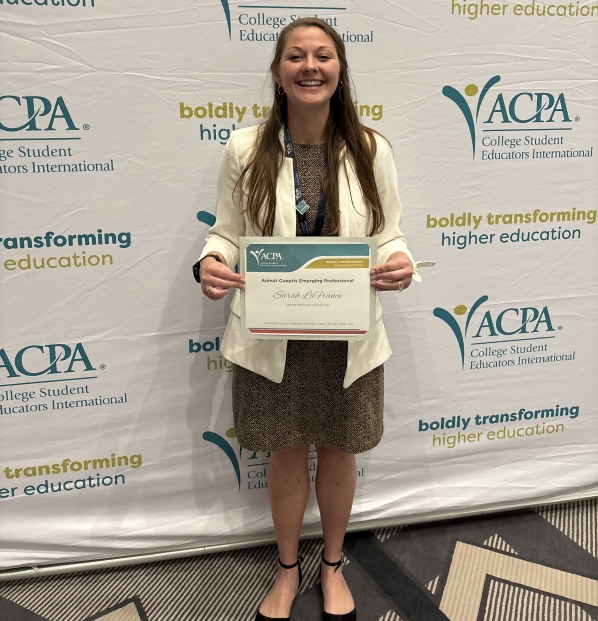Sarah LaFrance, originally from Wyalusing, Pennsylvania, graduated from Appalachian State University with a Master of Arts in student affairs administration.
LaFrance currently works at James Madison University as the assistant director of student affairs assessment, leading efforts to build greater capacity and skill in the use of data and information to produce insights and actionable steps from the assessment of student learning outcomes and examining unit effectiveness.
“I credit the amazing opportunities I was provided at App State in helping me get to my current role,” said LaFrance. “In particular, I owe so much to my professional mentor and contributor to the field of student affairs assessment, Dr. Heather Strine-Patterson, who serves as the director of student affairs assessment at App State.”
“Heather has made an incredible impact on my life and career development,” LaFrance continued. “She supported and encouraged me to continue in the field, helping me find opportunities to stay engaged in the work and the field even as I graduated in the pandemic and struggled to find my footing.”
“As someone who came to App State from out of state, and was nervous about finding my place and my people, the amazing professionals both on the faculty and Student Affairs side helped me feel at home and went beyond the traditional duties of their roles to pour into students like myself, offering their time and expertise to help support our growth both inside and outside the classroom,” she added.
Impacting Education in Her Community
LaFrance is making an impact on education in her community by supporting creative, innovative, and evidence-informed approaches to student learning and assessment.
“I have the opportunity to empower my colleagues in the division of student affairs to reclaim the title of educator and see the incredible impact they can have on the college student experience,” noted LaFrance. “Using an evidence-informed approach to designing and planning programs allows staff to know that the programs they are building are set up for success and to support student learning and development.”
“This approach also helps us to more easily see and thus address gaps in equity in our programs, such as student groups we might be underserving or providing the wrong resources and supports to based on the literature,” she continued.
“The more we can encourage student affairs practitioners to engage in building evidence-informed programming and assessing that programming the better prepared we can be to support college student learning and development and the easier it will be for offices to advocate for the additional funding and resources they need to improve their services and continue to support students,” she added.
Recently, LaFrance received the Annuit Coeptis Award: Emerging Professional from ACPA - International.
Started in 1979, the Annuit Coeptis Award honors five early career professionals at a dinner with the Annuit Coeptis Senior Professionals, where there can be wide-ranging discussions and exchanges about professional issues. These awards were created by ACPA (College Student Educators International) to celebrate the lives of Philip A. Tripp, Ursula Delworth, and Cynthia Johnson who dearly loved to challenge their contemporary and junior colleagues in a spirit of personal and professional sharing, good humor, and intellectual debate. The Latin phrase “annuit coeptis” reflects Professor Tripp’s optimism for the future by suggesting that “He has smiled upon that which we have begun.”
“I am truly honored to have been nominated and selected to receive this award,” said LaFrance. “I do not accept this award alone; it is as much due to my own contributions and efforts as it is due to the wonderful practitioners in higher education, who have taken a chance on me, supported and encouraged me, and given me opportunities to learn and engage in the work.”
“I am also grateful to have had faculty and staff who modeled the importance of engaging in the work not only on your own campus but in the field more broadly,” she continued. “Getting connected and volunteering on a regional and national level with organizations such as ACPA has helped me build community, share my own work and learn from so many amazing folks in the profession.”
“I would encourage graduate students and new professionals, regardless of their field or profession, to get involved in these types of organizations early and often,” she added.

